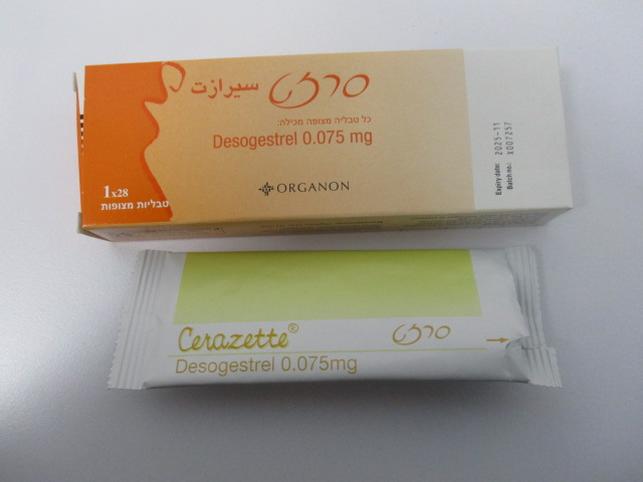Quest for the right Drug

סרזט CERAZETTE (DESOGESTREL)
תרופה במרשם
תרופה בסל
נרקוטיקה
ציטוטוקסיקה
צורת מתן:
פומי : PER OS
צורת מינון:
טבליות מצופות פילם : FILM COATED TABLETS
עלון לרופא
מינוניםPosology התוויות
Indications תופעות לוואי
Adverse reactions התוויות נגד
Contraindications אינטראקציות
Interactions מינון יתר
Overdose הריון/הנקה
Pregnancy & Lactation אוכלוסיות מיוחדות
Special populations תכונות פרמקולוגיות
Pharmacological properties מידע רוקחי
Pharmaceutical particulars אזהרת שימוש
Special Warning עלון לרופא
Physicians Leaflet
Interactions : אינטראקציות
4.5 Interaction with other medicinal products and other forms of interaction Note: The prescribing information of concomitant medications should be consulted to identify potential interactions. Effect of other medicinal products on Cerazette Interactions can occur with medicinal products that induce microsomal enzymes, which can result in increased clearance of sex hormones and may lead to breakthrough bleeding and/or contraceptive failure. Management Enzyme induction can occur after a few days of treatment. Maximum enzyme induction is generally observed within a few weeks. After drug therapy is discontinued, enzyme induction can last for about 4 weeks. Short-term treatment Women on treatment with hepatic enzyme-inducing medicinal or herbal products should be advised that the efficacy of Cerazette may be reduced. A barrier contraceptive method should be used in addition to Cerazette. The barrier method must be used during the whole time of concomitant drug therapy and for 28 days after discontinuation of the hepatic enzyme-inducing medicinal product. Long-term treatment For women on long-term therapy with enzyme inducing medicinal products, an alternative method of contraception unaffected by enzyme-inducing medicinal products should be considered. Substances increasing the clearance of contraceptive hormones (diminished contraceptive efficacy by enzyme induction) e.g.: Barbiturates, bosentan, carbamazepine, phenytoin, primidone, rifampicin, efavirenz and possibly also felbamate, griseofulvin, oxcarbazepine, topiramate, rifabutin and products containing the herbal remedy St. John's Wort (hypericum perforatum). Substances with variable effects on the clearance of contraceptive hormones: When co-administered with hormonal contraceptives, many combinations of HIV protease inhibitors (e.g. ritonavir, nelfinavir) and non-nucleoside reverse transcriptase inhibitors (e.g. nevirapine) and/or combinations with Hepatitis C virus (HCV) medicinal products (e.g. boceprevir, telaprevir), can increase or decrease plasma concentrations of progestins. The net effect of these changes may be clinically relevant in some cases. Therefore, the prescribing information of concomitant HIV/HCV medications should be consulted to identify potential interactions and any related recommendations. In case of any doubt, an additional barrier contraceptive method should be used by women on protease inhibitor or non-nucleoside reverse transcriptase inhibitor therapy. Substances decreasing the clearance of contraceptive hormones (enzyme inhibitors): Concomitant administration of strong (e.g. ketoconazole, itraconazole, clarithromycin) or moderate (e.g. fluconazole, diltiazem, erythromycin) CYP3A4 inhibitors may increase the serum concentrations of progestins, including etonogestrel, the active metabolite of desogestrel. Effects of Cerazette on other medicinal products: Hormonal contraceptives may interfere with the metabolism of other drugs. Accordingly, plasma and tissue concentrations of other active substances may either increase (e.g. ciclosporine) or decrease (e.g. lamotrigine).

שימוש לפי פנקס קופ''ח כללית 1994
לא צוין
תאריך הכללה מקורי בסל
לא צוין
הגבלות
לא צוין
מידע נוסף
